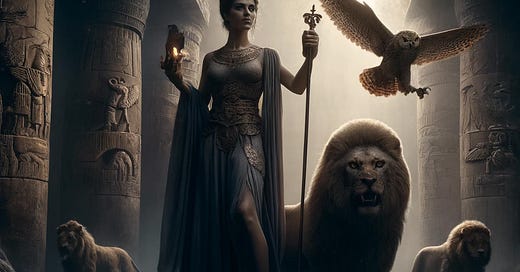Myth of the Day: Allatu
Unearth the intriguing story of an ancient Mesopotamian goddess who ruled the underworld with a powerful scepter and unforgiving gaze.
Region/Culture: Mesopotamia, Mesopotamia and Ancient Near East
Mythos: Akkadian/Assyrian/Babylonian Mythology
Primary Type/Nature: Gods and Deities
Mythical Attributes: Often associated with the underworld and darkness.
Role in Mythos: Serves as a goddess of the underworld, responsible for receiving the dead.
Relation to Humans: Viewed as a fearsome deity, Allatu holds the power to judge human souls after death. Offerings and prayers were made to appease her and seek a favorable afterlife.
Let us delve into the ancient lands that stretched between the Tigris and Euphrates rivers, where civilizations sprung from the cradle of life itself. In the heart of Mesopotamia—among the Akkadians, Assyrians, and Babylonians—lived gods and goddesses whose tales were woven with the threads of human destiny. One such deity was Allatu, the unforgiving goddess of the underworld.
Her visage was not for the faint-hearted. Often envisioned as a fearsome woman, her stern countenance was a warning to all who dared to cross the boundary between life and death. She held a scepter of formidable power, the emblem of her authority over the afterlife. But she was never alone, for lions roared at her side and owls hooted a grim tune above her, their very presence an omen of the darkness she ruled.
Her origins are as mysterious as the underworld itself. In a realm where the sun never shines and rivers flow with forgetfulness, Allatu was the eternal custodian of souls. Did she emerge from the primordial dark, or was she birthed by gods even older than she? The ancient texts are poetic but inconclusive. Yet, there is no doubting her reign over that shadowy realm. In fact, her name bears the weight of eternities, the linguistic sediment of the Akkadian “Allatum,” Assyrian “Elat,” and Babylonian “Ereshkigal,” all of which served as titles for the great underworld deities of their respective eras.
Though her story is peppered across multiple mythologies, a tale reverberates through the whispers of priests and the chiseled hieroglyphs on temple walls. It is said that Allatu received the soul of a king, who believed his wealth and valor would win him a comfortable afterlife. In a twist only fit for divine irony, Allatu deemed him unworthy, banishing his soul to wander in eternal darkness. A cautionary tale, it inspired offerings and fervent prayers to Allatu in hopes of a favorable judgment.
Allatu was not simply a figurehead in her domain; she was its arbiter. Her special powers reached beyond the scepter she held. Her gaze could weigh the souls of the departed, judging their life’s deeds with unsettling accuracy. A mere whisper from her could alter the fate of a spirit, either inviting it into the sanctuary of rest or condemning it to the void of suffering. Those who pleased her might even attain a semblance of peace, a rarity in the grim vastness of the underworld.
However, even a goddess as formidable as Allatu had weaknesses. For one, she was bound to the underworld, unable to venture into the world of light. Her powers were inextricably tied to her dominion, a realm that thrived in obscurity and dread. Moreover, her judgments, though absolute, were confined to the souls who entered her realm. She had no sway over the gods of other territories, and even among her own, her word was but a part of a cosmic dialogue, always influenced by the whims and politics of her divine peers.
And so, the tale of Allatu persists, a tale both awe-inducing and cautionary. To this day, her name echoes in the silent corridors of history and in the restless dreams of those who ponder the great beyond. An offering to her might not save your soul, but a prayer in her name might lend it a moment’s solace in the ever-present, ever-daunting abyss of the afterlife.
Suggested Further Reading
Explore more myths and wonders by visiting godsandmonsters.info.





